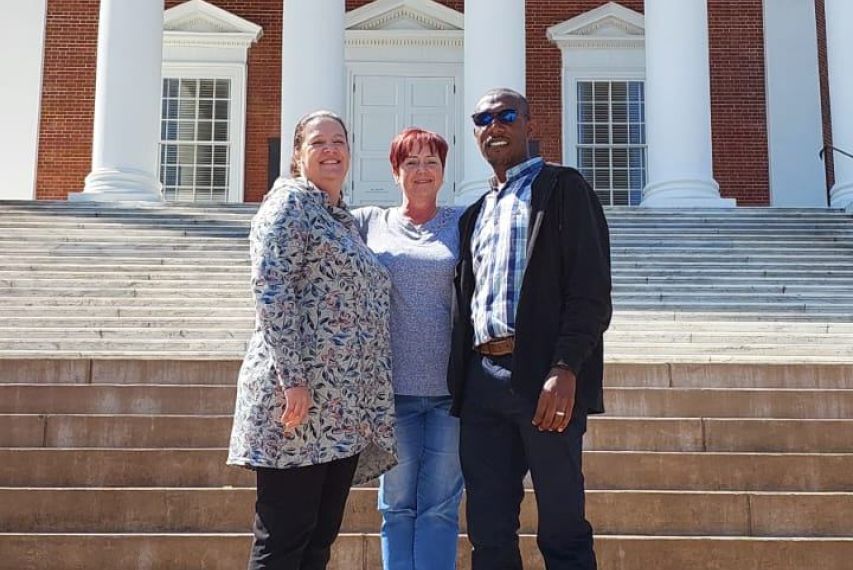The collaborative training program for mid-career South African faculty in health sciences emphasizes a dual MS or PhD pathway for those who are working towards these degrees. This program is especially beneficial for faculty members who are advanced in their careers but lack formal research training. “These mid-career faculty have a unique perspective because they have so much clinical experience,” said current CGHE director Scott Heysell. “The program not only benefits the visiting faculty members, but also enriches UVA faculty through co-mentorship opportunities and growing expertise in various areas.”
Enriching Global Health Equity: South African Scholars at UVA
Enriching Global Health Equity: South African Scholars at UVA

VA welcomed two distinguished faculty members from South Africa in April as part of a collaborative initiative supported by the Center for Global Health Equity (CGHE). The initiative supports faculty members through a unique PhD training program that bridges their institutions with UVA, facilitating cross-pollination of expertise and ideas.

Mpho Magwalivha works at the University of Venda (UniVen) in the city of Thohoyandou in Limpopo Province, a historically Black and predominantly rural area. UniVen has a rich history of collaboration with UVA researchers, including CGHE’s founding director and enteric infection-specialist Dick Guerrant. Magwalivha specializes in microbiology and virology, focusing on the detection of an enteric virus (Sapovirus) in stool samples from children under five years of age in rural communities.
“The idea was to find out if the conditions, including lifestyle and surroundings, in the rural settings can affect the genetic diversity of the Sapovirus,” said Magwalivha. Speaking on his motivation, he explained that most scientific studies are done in urban or developed areas, but rarely in rural, under-developed settings. In his study, he found a high prevalence rate of Sapovirus, especially in outpatients, as compared to what has been reported in urban areas, especially hospitalized cases.
Azette Swanepoel is head of the occupational therapy department at the University of the Free State (UFS) in Bloemfontein, a bustling city surrounded by agriculture and historically associated with Afrikaner culture. Swanepoel is an occupational therapist specializing in knowledge transfer in occupational therapy clinical practice. Her research focuses on the types of knowledge transferred in clinical practice and health science education.

The purpose of Magwalivha and Swanepoel’s visit to UVA was twofold: to provide them with dedicated time away from their home responsibilities in order to engage in their research, akin to a mini-sabbatical, and to foster interaction with their mentors and share research findings. During their visit, the researchers engaged in meaningful discussions, shared insights with UVA faculty and students, and planned new collaborations with UVA researchers.
“My time at UVA confirmed the value of a holistic view on health and well-being. By considering the context our patients come from and return to, the cultural and personal factors that might influence their health are important factors to consider,” Swanepoel explained. She noted that this collaboration with UVA, in addition to refining her research approach, also provides an opportunity for her to explore innovative strategies for teaching and learning.
Magwalivha too sees applying some of the ideas honed at UVA to engage with his home community. “What I plan to do is to communicate science to the villagers, so that when time comes for projects to be done in science, there will be a bit of understanding,” he said. He plans to engage with communities through learners at school levels first, then to move directly to the communities through village headmasters.
The program hopes to strengthen collaborations between UFS and UniVen, enhancing the development of research-oriented programs within their respective institutions and creating opportunities for student participation. For instance, UFS has become a site for student projects, with several students embarking this summer on a CGHE-funded initiative to develop a digital community health intervention to address local health challenges. The program also aims to shift the direction of UVA faculty collaboration and mentorship to focus more on skill sets rather than specific topics, such as emphasizing training in biostatistics and grant-writing.
CGHE also aims to establish more permanent links with UniVen and UFS through the new UVA South African office, once it is established, underscoring a long-term commitment to the region's interests. This collaboration not only facilitates faculty-related research opportunities but also strengthens existing partnerships, laying the foundation for continued innovation and enriching interdisciplinary student experience in the pursuit of global health equity.


